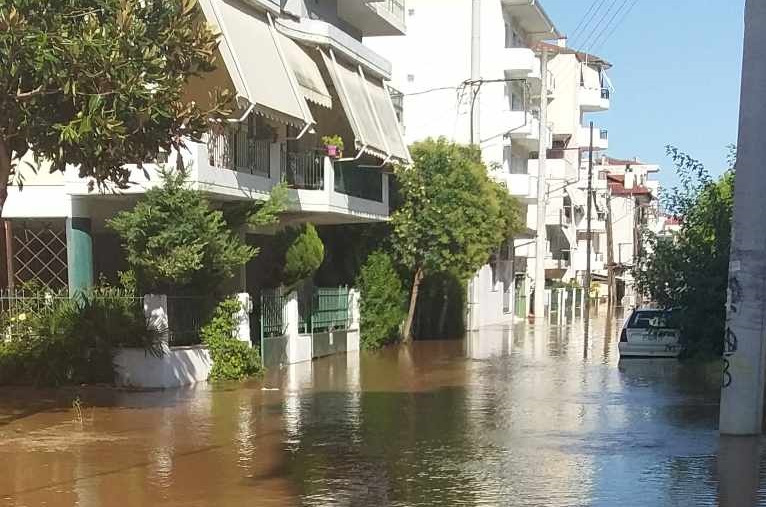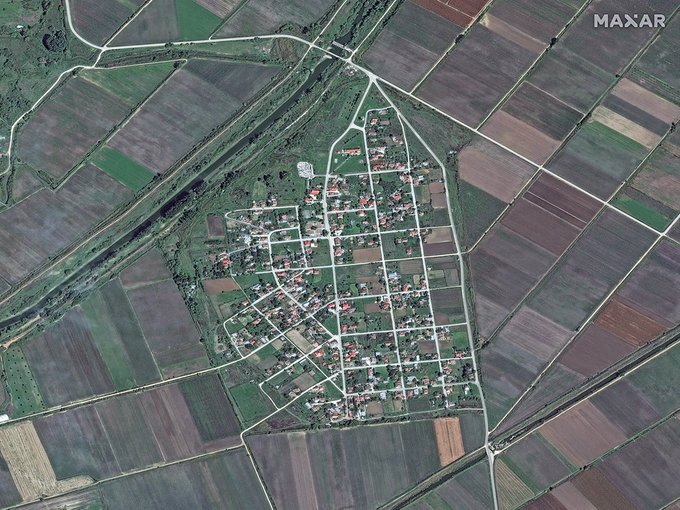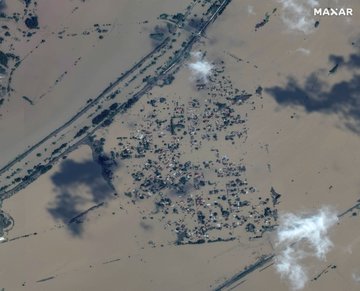Ed. note: This article was published in Brave New Europe on September 12.
It is one thing to warn about the climate change and another when you become its victim. Wolfgang Knorr is among the more radical climate scientists. He is still cut off from his home and family (they are still without running water and phone lines) following the unprecedented rains in Greece a week ago.
When writing down this title, I was gripped with a sense of shame. Didn’t this sound a lot like “postman bitten by dog” or something? Who in the world would be interested? So I was going to write this down for the sake of whoever would care to publish and know better.
I started out in climate science shortly after the Rio Conference in 1992. It is now 2023 and I have been hit personally by the most violent rainfall event ever recorded in Europe. It feels very different from anything I had ever felt as a climate scientist. Despite of all that knowledge amassed over the decades, I wasn’t prepared for this. I have now realised that I too am suffering from climate anxiety.
I work mostly in Germany, but my family – my wife is Greek – lives in a small village outside of the Thessalian port city of Volos. The area’s claim to fame are the mythical centaurs, who are supposed to have roamed the peninsula of Pelion in ancient times, the argonauts, and a narrow gauge railway designed by the father of the famous surrealist painter Giorgio de Chirico, who himself was born in Volos.
Then, on Wednesday the 6th of September, and the following day, this exact area was hit by a confluence of atmospheric chance events that conspired to flood the area with an amount of rain that would normally fall in an entire year in the wetter parts of the Mediterranean basin, or anywhere else in Europe.
During those days I was still in Germany with my seven year old daughter, still on school holidays soon to be prolonged involuntarily. A high-pressure system over central Europe made northern Germany bake in a September heatwave I had never experienced before, with warm nights reminiscent of the Mediterranean where I would fly in a few days. But at the Eastern end of that mighty heat engine, cold air from Russia was pumped south.
The bad news was that that year, the Mediterranean Sea, along with the entire Atlantic Ocean, was far warmer then it should have been. Like a warm bath tub it was brewing moisture that was filling the regional air. Until it was hit by the cold air masses, that is. Cold air can’t store much moisture, and so that volume of water had to go somewhere, and that somewhere was down.
When you look at a map of the Pelion peninsula, you understand the vulnerability of the place. It frequently receives cold air masses that have gathered moisture over warm waters, be it the northern Aegean Sea, or the Black Sea. This year we were bathing in the sea until early February, only to be hit by half a metre of snow the next day.
The traumatic events of the Ahrtal flooding in Germany only two years ago still vividly in memory, I found out that the rainfall there had been an estimated 100 to 200 millimetres in one event. In Greece, it was a staggering 750 to 1000, more typical of monsoons or Hurricanes.
So far the ramblings of the theoretical mind. But having your home and family hit by cataclysmic rains, the road blocked off, village streets turned into mountain streams, with water, phone line (permanently) and electricity (temporarily) removed, feels very different.
The worst thing though is that I wasn’t there to help. And then, after flying back on the Friday after, stocking up on supplies in Thessaloniki the next day and driving home to come to the rescue, I had to discover that in the meantime the fields, streets and even tunnels of the entire province of Thessaly had been turned into waterways. The rain had moved inland, and the surplus water was starting to drain down the river system, cutting off the entire province. I am now stranded less than two hours’ drive from home, with a lot of time to read and reflect.
During my involuntary stay I read an interview with a fellow climate scientist and Professor at the Potsdam Institute for Climate Impact Research, Stefan Rahmstorf, about the worsening climate crisis. Stefan says all the right things, for example that there is no turning back and that the heating we have already caused will be there to stay. But there is something about the language he uses that just doesn’t quite cut it. It is as if he feels compelled to preserve a ‘professional’ composure, which always seems to work in the direction of playing down the threat between the lines. As if he has cut himself off from the kinds of emotional experiences I was just going through.
For example, he rightly says that at some stage it looked like we were going for four degrees planetary heating, but that now thanks to climate measures it was only 2.7. It seems quite clear to me that the four degrees were a felt number, but the 2.7 something his rational mind had picked up. (The source must be the Climate Action Tracker’s “current policy” scenario.)
There is no way we can quantify the degree of heating by 2100 to anything even close to tenths of a degree. Even to decide what is understood or to be expected by “current policies” is so open to debate that you can have many widely diverging answers. We also can’t exactly quantify how much of the emitted greenhouse gases will stay in the atmosphere for how long, and how that will translate into warming degrees. And those degrees of warming do not say anything about where and when climate extreme events will hit. If he had said we are playing Russian roulette, as the American climate scientist Jim Hanson has done decades ago, he would have characterised the situation far better.
If we can’t even get climate scientists to choose entirely honest words for describing the situation, there is no hope of any meaningful action. We are then confronted with only the quite honest concerns of people who consider climate policy a hoax intended to have them pay to enrich greedy politicians and their pals from the big corporations. Which let’s me speculate that at the end of the day, there are plenty of powerful people who are quite happy with that lack of open words and honesty.







